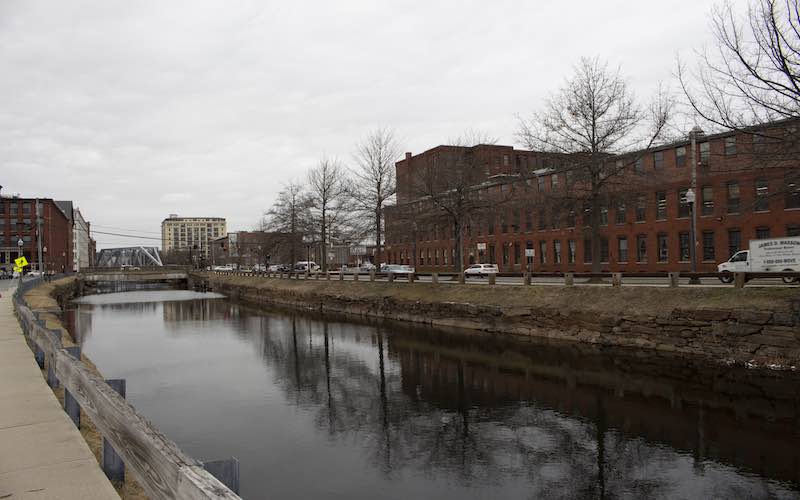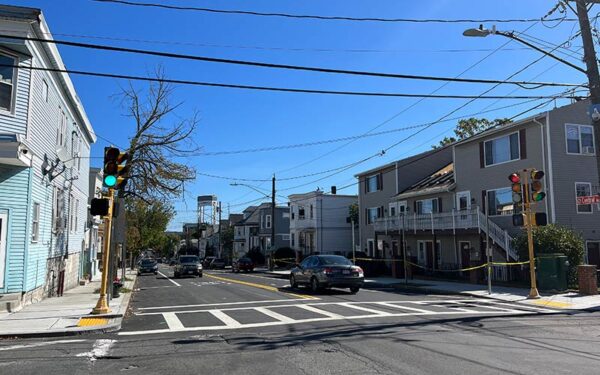
A section of the historic canals in Lawrence. Photo: Bethany Kwoka
Two years after gas explosions rocked the Merrimack Valley, Lawrence is still fighting to ensure the health, safety, and wellbeing of its residents. While Columbia Gas – the company responsible for the explosion that killed a local teenager and disrupted the lives and livelihoods of thousands – will no longer be operating in the area, residents remain concerned about Eversource taking its place. Will this corporate acquisition actually help them rebuild, or will it be just another fossil fuel company prioritizing profits over the community’s wellbeing?
Our partners at Groundwork Lawrence are tackling this problem head on. They’re shining a light on how difficult recovery has been and the steps still needed to make Lawrence whole.
We’re also weighing in to ensure that Massachusetts not only helps Lawrence rebuild, but its utilities are set up to meet the State’s climate goals. The transition from Columbia Gas to Eversource has to be approved by the State – and is an opportunity to ensure that Eversource is both committed to community safety and to lowering the company’s climate-damaging emissions.
In fighting for Lawrence’s recovery, we can protect communities across the Commonwealth, too.
What Lawrence Still Needs Two Years Later
Earlier this month, Governor Baker declared an end to the State of Emergency that was put in place in the Merrimack Valley after the explosion. But despite this seemingly good milestone, residents, businesses, and community-based organizations are still rebuilding – while facing some of the highest COVID-19 rates in the Commonwealth.
Eversource and Columbia Gas are currently hammering out the details of their settlement agreement – which creates programs to support residents of the Merrimack Valley and lays out how the $56 million Columbia Gas must pay for its role in the disaster will be spent. Some great proposals are included, but additional work is needed to ensure they are responsive to on-the-ground conditions in Lawrence. The gas explosions also affected Andover and North Andover, but what works for their housing and business environments will not work equally well for Lawrence residents. Massachusetts must ensure that resources from this settlement are distributed equitably and focused where they’re most needed.
Groundwork Lawrence, a community based environmental justice nonprofit, lays this out in their public comments to the Department of Public Utilities about the proposed settlement. In its letter, the organization calls for the following:
- Tenant protections to ensure renters are not evicted or priced out if landlords update their buildings using funds from the Merrimack Valley Renewal Fund.
- Climate resiliency projects as part of clean energy and energy efficiency initiatives. Lawrence already deals with the urban heat island effect because of its lack of green space. Rising temperatures will make this worse and affect those in Lawrence more than their neighbors in greener, leafier communities.
- More funding for community development corporations and community action programs that help residents find affordable housing. The affordable housing initiative that’s part of this settlement doesn’t mention these nonprofits, which play an important role in the community.
- Clarity in how funds will be distributed to ensure the renters who need it most are able to access affordable, energy efficient housing.
With these changes, Groundwork Lawrence is calling for the Massachusetts Attorney General and the Department of Energy Resources to ensure Lawrence residents aren’t left behind as changes are made to move past Columbia Gas’s mismanagement.
The Future of the Merrimack Valley and Massachusetts
While this settlement agreement must address urgent community needs, it also presents a once-in-a-decade opportunity to push our 2050 climate goals forward. The future of the Merrimack Valley hangs in the balance, and so does that of communities across the Commonwealth.
If Massachusetts continues to rely on dirty gas to power its homes and businesses, every community is at risk of both dangerous explosions and severe climate impacts. To best serve us as their customers, utilities need to shift focus away from fossil fuels. They’re also required to do so by Massachusetts law.
Governor Baker has committed to reaching net-zero climate-damaging emissions by 2050. To meet this target, utilities must replace fossil fuels like gas with clean energy and energy efficiency measures. Massachusetts Attorney General Maura Healey is also investigating what role, if any, gas will play in our energy future. This means new business models for utilities, and new ways of operating in our communities.
As part of the settlement agreement, we’re asking that Eversource commit to reaching net zero emissions by 2050 – and that the Department of Public Utilities hold them accountable to this target going forward. Eversource must draft a long-term plan that is reviewed and approved by the department. This plan should not only address how the company intends to help communities in the Merrimack Valley recover, but also how it will modify its operations going forward to meet the Commonwealth’s climate goals.
Ultimately, the future of the Merrimack Valley, and of communities across New England, is tied to ditching fossil fuels like gas in favor of clean energy.
What’s Next in the Merrimack Valley?
The case is moving quickly. Over the next few months, Massachusetts will decide how Columbia Gas will remove itself from the Merrimack Valley, and how Eversource will operate in the local communities.
Sign up for our email list to stay on top of the latest in this evolving case.



